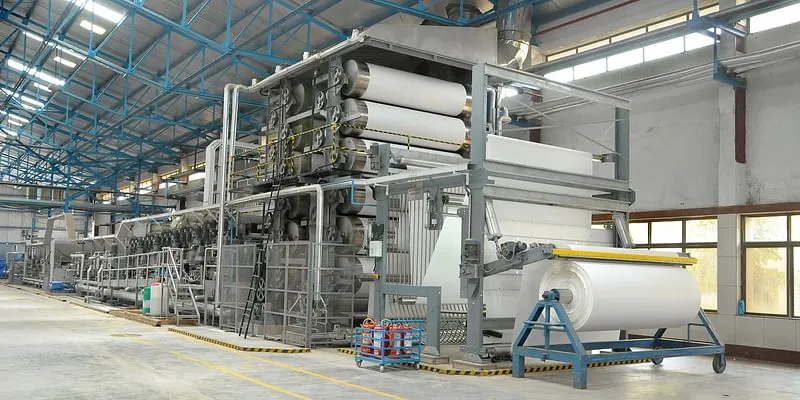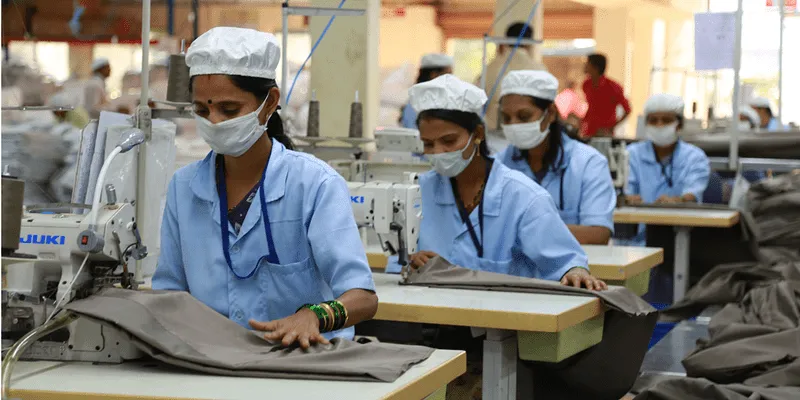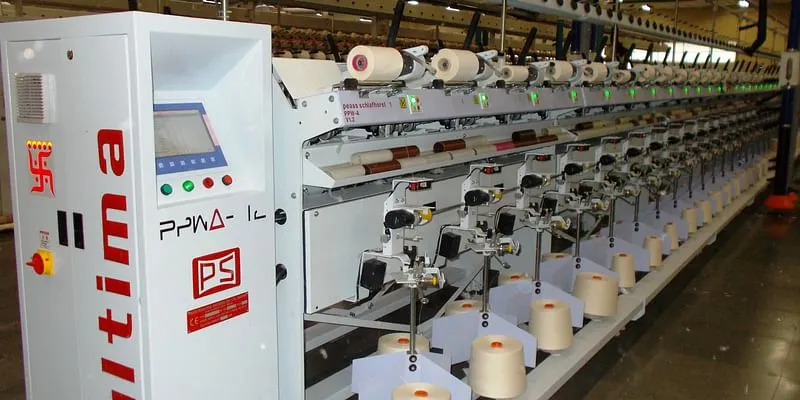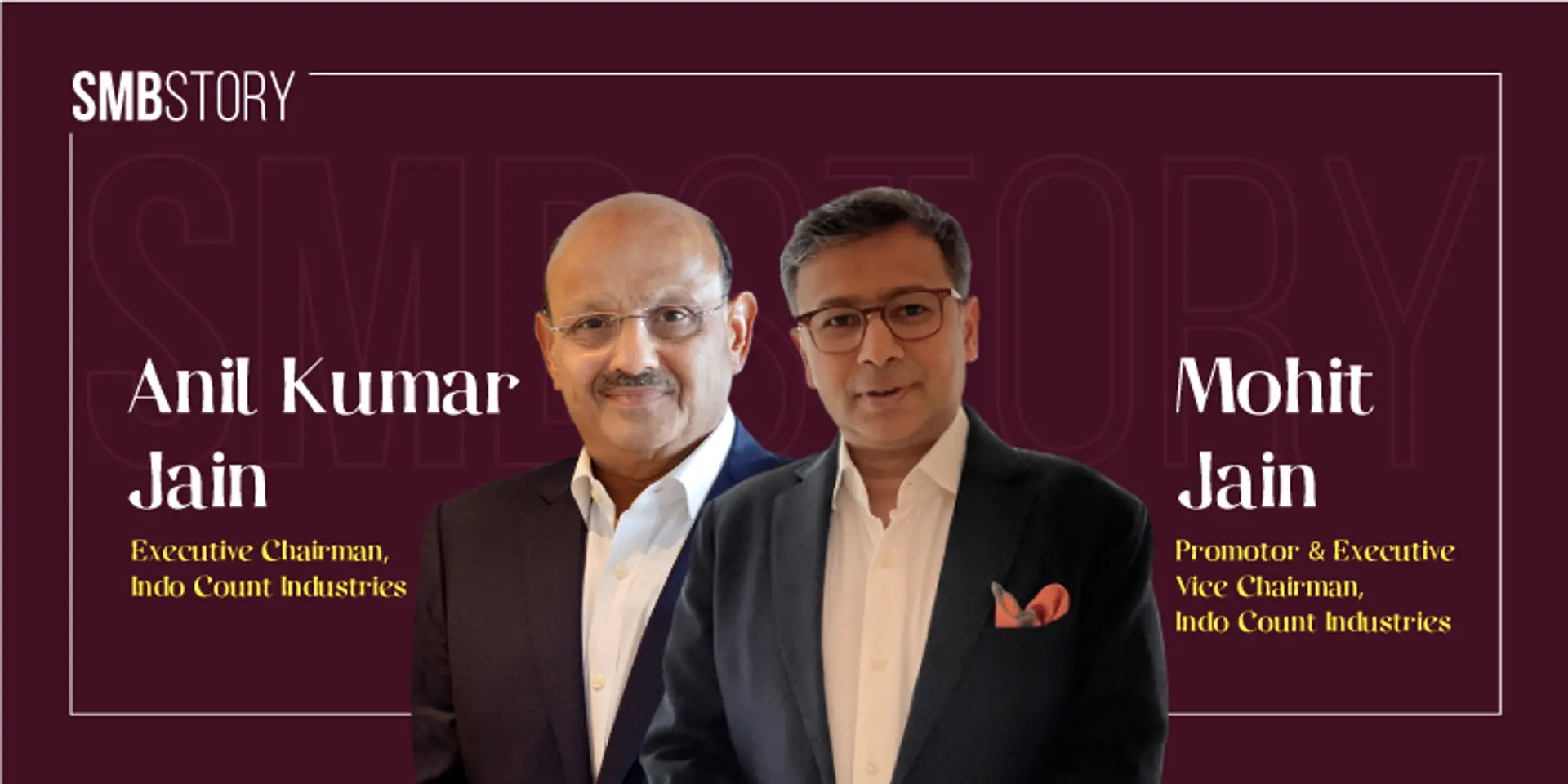This father-son duo built their cotton yarn spinning unit into a profitable textile business with Rs 2,552 Cr net sales
When Anil Kumar Jain started Indo Count in 1988, little did he know his cotton yarn unit would grow into one of India’s leading players in the home textile market. Here’s how Anil and his son Mohit took their Made-in-India textiles business to new heights.
When Anil Kumar Jain started Indo Count in 1988, it was just a small, export-oriented unit (EOU) for cotton spinning in Kolhapur, Maharashtra. Through the 90s, his business exported all its cotton textile to various countries in Europe as well as the US, and more.
The entrepreneur had started Indo Count after hearing family members based in the UK complain about the poor quality of cotton textiles produced in India.
But little did he know his mission to address this problem would lead to his business becoming one of India’s leading players in the home textile market.
His son, Mohit Jain, Promoter and Executive Vice Chairman at Mumbai-headquartered Indo Count, says:
“My father bought some land in Kolhapur as it was just 400 kms from Mumbai, and the weather was conducive for cotton. He started the facility under the Maharashtra Industrial Development Corporation (MIDC) project, which provided water, electricity, and other basic infrastructure.”
In 2005, Indo Count also forayed into the home textile business of bedspreads, blankets, mattress, mattress cover, pillows, duvets, etc. Between 2011 and 2017, it set up its presence in the US, UK and Dubai.
Today, over 30 years since inception, Indo Count has grown into a profitable firm with Rs 2,552.49 crore net sales and profit after tax of Rs 260.26 crore (FY21).
It claims it exports to home textile retailers in over 54 countries and has also developed in-house B2C brands such as Boutique Living, Heirlooms of India, Atlas, Revival, The Pure Collection, Haven, etc.

Inside the Indo Count unit
Import quota elimination
Mohit attributes the dismantling of import quotas in 2005 as a key factor in influencing Indo Count to venture into home textiles and scale the heights that it has since then.
Import quotas are trade restrictions that set physical limits on the quantity of goods (in this case, textiles) that can be imported by a country.
After the use of quotas in all textile and clothing trade between WTO nations was eliminated in 2005, Indo Count began integration of weaving, dyeing, cutting etc so it could produce finished goods.
Despite not having experience with such integration, Mohit claims the firm took a leap of faith and invested in product development.
He explains, “When quotas were removed, we took the opportunity and acquired some land for home textiles production about 10 kms from our parent spinning mill. The segment is the core part of our business now. We don’t sell cotton yarn as much as we used to anymore.”
He claims Indo Count is now the largest exporter of bed linen from India. “Ninety-eight percent of our revenue comes from overseas, and our customers are anyone who owns a retail store and wants to sell bed linen in their own brand. The likes of Walmart, Target, and even Amazon purchase from us,” he adds.

The Indo Count workforce
COVID-19 impact
Indo Count posted its revenue and profit figures - its highest ever - despite COVID-19 resulting in lockdown of manufacturing facilities and muted demand across March-May 2020.
The previous year (FY20), Indo Count had posted Rs 1,965.07 crore net sales and Rs 73.76 crore profit after tax.
As people increasingly spent more time working from home amidst the pandemic, Indo Count saw demand for home textiles not only return but also swell to unprecedented levels.
“Across countries, people realised the importance of investing in home products. We realised this consumer behaviour is here to stay. Our installed capacity, which we’d worked on increasing before COVID, proved fruitful and helped us achieve sustainable growth,” Mohit says.
The second-gen entrepreneur also feels Indo Count has grown faster than its competitors, and that India is well positioned to meet rising demand for home textile products.
“India is the largest grower of cotton in the world. Further, the world has realised the drawbacks of being overdependent on a single exporting country like China. Thus India’s share in the global home textiles market will play out well in the coming years,” he says.
Indo Count also recognises the government’s push for Atmanirbhar Bharat for import substitution and capacity building to dominate the global market, as well as access to a skilled, traditional textile labour force, as the other factors influencing its future plans.

Yarn spinning machinery at Indo Count
Competition and future plans
Although Mohit doesn’t name Indo Count’s competitors in this race, industry reports indicate Welspun Group, Raymond Group, Bombay Dyeing, and Alok Industries as the other market leaders in the space.
These Indian bed linen exporters, like Indo Count, cater majorly to international markets such as the US and Europe, with some growth coming in consumer demand for the Indian market, according to a Mordor Intelligence report.
Most players focus on cotton - a key fabric for bed sheets due to its durability, comfort, and breathability.
“The competition is straightforward and it depends who can add more value to customers and do a better job. Going forward, we are increasing our production capacity from 90 million metres of bed linen per day to 108 million metres and modernising our spinning facility. We are not in a sprint to beat others, but we are here to stay and take care of our long-term trajectory,” Mohit explains.
YourStory’s flagship startup-tech and leadership conference will return virtually for its 13th edition on October 25-30, 2021. Sign up for updates on TechSparks or to express your interest in partnerships and speaker opportunities here.
For more on TechSparks 2021, click here.
Applications are now open for Tech30 2021, a list of 30 most promising tech startups from India. Apply or nominate an early-stage startup to become a Tech30 2021 startup here.
Edited by Teja Lele










